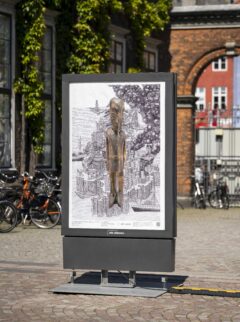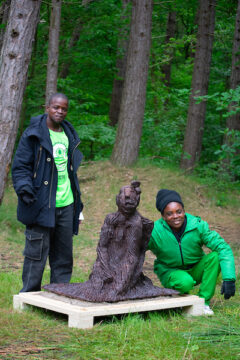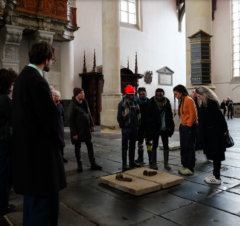Vacature zakelijk leider Human Activities
Over Human Activities
Human Activities, opgericht door kunstenaar Renzo Martens, wil met kunst ongelijkheid opheffen. De komende jaren voeren we een nationaal en internationaal programma uit van exposities, films, educatie en regeneratieve landbouw, en ontwikkelen we een nieuw participatief kunstplatform in Zeeland.
Het instituut bestaat uit een klein, hecht team, gevestigd in Amsterdam (en binnenkort ook in Zeeuws-Vlaanderen). Het kernteam wordt ondersteund door freelancers.
Human Activities heeft een samenwerkingsverband met CATPC, het kunstcollectief van plantagearbeiders uit DRC. Met de opbrengsten van hun kunst kopen zij uitgeput plantageland terug en herstellen het. In 2024 verzorgden we met CATPC en Renzo Martens de Nederlandse inzending op de Biënnale van Venetië.
Wij zijn op zoek naar een zakelijk leider 32 uur per week, die als spin in het web van de organisatie gaat functioneren.
De functie
Als Zakelijk Leider ben je verantwoordelijk voor de interne organisatie, bedrijfsvoering en uitvoering van de activiteiten van Human Activities. Je zorgt ervoor dat de activiteiten en het programma van de organisatie haalbaar, zorgvuldig en duurzaam worden gerealiseerd.
Je werkt nauw samen met de directie (bestaand uit een algemeen directeur en de artistiek directeur) en het team. Jij bent het vaste interne anker: je brengt structuur, overzicht en rust in een organisatie die werkt met complexe, vaak nieuwe en innovatieve projecten. Je bent sparringpartner van de algemeen directeur op het gebied van organisatie en uitvoering, en stemt inhoudelijke kaders af met de directie. Je signaleert tijdig knelpunten en kansen.
Wat ga je doen?
Organisatie & bedrijfsvoering
• Je draagt zorg voor de dagelijkse organisatie van Human Activities.
• Je stuurt de vaste medewerkers en projectmedewerkers aan.
• Je bewaakt werkprocessen, planning en prioriteiten.
• Je draagt bij aan een gezonde werkdruk en duidelijke interne afspraken. Je organiseert project- en teamoverleggen.
• Je zorgt dat informatie goed wordt gedeeld binnen de organisatie.
Projectrealisatie
• Je vertaalt samen met de directie plannen en concepten naar uitvoerbare projecten.
• Je zorgt voor de uitvoering van deze projecten, en stuurt de projectleiders aan.
• Je bewaakt voortgang, risico’s en haalbaarheid tijdens uitvoering.
• Je maakt contracten met freelancers, partners en kunstenaars.
Financieel beheer
• Je stelt samen met de algemeen directeur en teamleden (project)begrotingen op, en bewaakt deze.
• Je beheert de cashflow en financiële administratie samen met de financieel medewerker.
• Je verzorgt financiële verantwoording richting fondsen en partners.
• Je ziet toe op naleving van de drie codes (Fair Practice) en relevante wet- en regelgeving.
Wie zoeken wij?
Je herkent jezelf in het volgende profiel:
• Je hebt ervaring met zakelijke en organisatorische verantwoordelijkheid in de culturele sector.
• Je bent sterk in plannen, structureren en prioriteren.
• Je hebt financieel inzicht en ervaring met subsidies en verantwoording.
• Je kunt omgaan met artistieke processen zonder deze te willen sturen.
• Je communiceert helder en werkt graag samen.
• Je voelt je prettig in een relatief kleine organisatie met grote ambities.
Wat bieden wij?
• Een inhoudelijk sterke en maatschappelijk relevante organisatie;
• Nationaal en internationaal impactvolle en zichtbare projecten.
• Een sleutelrol binnen een compact, betrokken team.
• Veel ruimte voor eigen professionaliteit en verantwoordelijkheid.
• Een aanstelling van 32 uur per week.
• Een marktconform salaris, passend bij ervaring en verantwoordelijkheden.
• Een arbeidsovereenkomst voor een jaar, met de intentie tot verlenging.
Solliciteren
Stuur je cv en motivatiebrief naar Janke Brands via janke@humanactivities.org. Voor vragen over deze vacature kun je eveneens contact opnemen via dit e-mailadres, eventueel kan er een belafspraak worden ingepland. Solliciteren is mogelijk tot en met 27 februari 2026. Acquisitie naar aanleiding van deze vacature wordt niet op prijs gesteld.
Leren, Graven, Bouwen in Terneuzen
On a field in the Netherlands, Human Activities has taken the first steps toward establishing White Cube Zeeuws-Vlaanderen, a new art center dedicated to the articulation of the art and culture of rural communities. The master plan for White Cube Zeeuws-Vlaanderen is being developed through co creation with the local community, in collaboration with architect David Gianotten (OMA).
As part of these co-creation sessions, students from the Lodewijk College in Terneuzen participated in the project week Leren, Graven, Bouwen (Learn, Dig, Build). Through a series of workshops guided by Human Activities and professional artists-educators, students learned new techniques while digging into the history of their land, and exploring the needs and possibilities for the future of the Zeeuws-Vlaanderen region. Their artworks expressed these reflections and considered the role of the future White Cube Zeeuws-Vlaanderen.
On 18 December 2025, the exhibition, fully created and curated by the students, opened to the public in Nesse, with guided tours held on 19, 20 and 21 December 2025. Leren, Graven, Bouwen is one in a series of co-creation sessions that are central for thedevelopment of the upcoming art center.
CATPC in ArtReview’s Art Power 100
Human Activities congratulates CATPC on its consecutive nomination to the yearly Art Power 100 list, ArtReview’s annual portrait of the most influential individuals and groups in the artworld. At last, communities that work and live on the plantations that have funded the establishment of key western art museums are starting to be recognized. ArtReview cites CATPC among initiatives that “are reinventing how their work should be distributed and who their audience should be, and who consciously plug the economics (which is to say the wealth) of the artworld into quite different social contexts.”
CATPC: “We express our gratitude to God and our ancestors for this renewed inclusion, which we dedicate to all plantation communities around the world. We are happy that through this recognition by ArtReview Magazine, we can continue to share the “unhealthy privileges” of art, transcend the colonial divide, and support each other in a spirit of solidarity. We dedicate and share this victory with all plantation workers. Especially those in Congo, Indonesia, Suriname, the Caribbean islands, and elsewhere in the world who, through forced labor, have involuntarily contributed to the existence of museums in the West. We also want to express our gratitude and joy for all the inspiration that brother Ibrahim Mahama has brought us. This collective achievement is proof that together, anything is possible.”
CATPC hosts “Learn, Dig, Build” conference at K21 in Düsseldorf
In the framework of the exhibition Land and Soil. How We Live Together, on view until 19 April 2026 at K21 in Düsseldorf, Germany, CATPC hosts the conference Learn, Dig, Build.
The conference centers CATPC’s position as a community of plantation workers. Speaking from various lived experiences, they reflect together with the most forward-thinking artists of this generation on their work with land, NFTs, and regeneration, and on how their perspectives may resonate with or amplify the regenerative practices of CATPC.
Program:
Saturday, 29 November, 11:30 — Learn
CATPC in conversation with: Johannes Büttner, Renzo Martens, and Alex Wissel.
Saturday, 29 November, 12:00 — Dig
CATPC in conversation with: Havîn Al-Sîndy, Nir Evron, and Christopher Kulendran Thomas.
Saturday, 29 November, 12:50 — Build
CATPC in conversation with: Simon Denny, Paul Kolling (terra0), and JP Raether.
The conference is hosted by CATPC and Kolja Reichert, Chief Curator of K21. It is developed as a collaboration between K21, CATPC, and Human Activities and is supported by the Mondriaan Fund.
Launches Toolkit: Seven Easy Steps for Museums to Liberate the Plantations that Funded Them
Today at the Wereldmuseum Amsterdam, CATPC launches Seven Easy Steps for Museums to Liberate the Plantations that Funded Them. In seven clear steps, this toolkit creates a framework for museums which have profited from the plantation economy to move beyond symbolic gestures toward genuine repair with plantation communities.
The toolkit is presented by Matthieu Kasiama, Mbuku Kimpala, and Ced’art Tamasala from CATPC in a keynote presentation at the Wereldmuseum Amsterdam during a seminar for museum professionals entitled HERE: Heritage Reflections. The event is focused on restitution and is initiated by the Mondriaan Fund, the public fund for visual arts and cultural heritage in the Netherlands.
Developed by CATPC and Human Activities, this toolkit draws from the perspectives of plantation worker communities and Western art institutions to help museums rethink their origins, responsibilities, and futures. It is especially designed to guide museums built with profits extracted from plantation worker communities.
The short handout version of the toolkit can be downloaded here. The full version can be accessed here.

CATPC at one of the plantation that funded the Stedelijk Museum, 2024, 6’32”. (still)
Exhibition “Echoes of a Day” at the White Cube in Lusanga
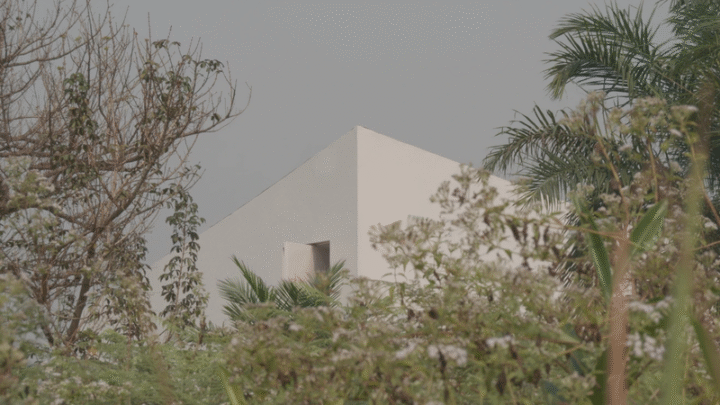
White Cube in Lusanga
On Tuesday 9 September 2025, at 15:00 CET, the exhibition “Echoes of a Day” will festively open at the White Cube in Lusanga, Congo, through a live video connection with Terneuzen, The Netherlands. It will run until 21 September 2025 and can also be visited online at whitecube.online.
For this exhibition, students of the Lodewijks College created works as part of a long-term collaboration with Human Activities. The students from Terneuzen met the members of the Congolese collective CATPC and drew on these discussions, linking them to their own experiences. Over the year, the students have been discovering how a community in Lusanga has reclaimed their land through art and started making works themselves.
The collaboration between Lodewijk College and Human Activities will continue in the future. Human Activities is developing a new art platform together with the people of Zeeuws-Vlaanderen in the Netherlands. The students of Lodewijk College are involved in all phases of the construction of this White Cube. This new art platform will work according to the same principle as in Lusanga: art enables the community to take back control of its history, land, and future.
The project is part of Human Activities’ program LEARN, DIG, BUILD, which is made possible by Mondriaan Fonds, Fonds21, Gieskes-Strijbis Fund, the municipality of Terneuzen, and the province of Zeeland.
In Memoriam: Derk Sauer
We are deeply saddened by the sudden passing of our beloved chairman, Derk Sauer
His leadership and inspiration have been invaluable to Human Activities. In his role as chairman, he was deeply involved, in good times and bad, both practically and morally. With Derk, we were able to achieve things that would not have been possible otherwise. He was a smart, strong, and loyal friend to us all.
We are grateful that he dedicated himself to us and our mission — to redress inequality through art. His enthusiasm, decisiveness, passion, and loyalty will continue to inspire us on our journey.
Derk will remain in our hearts forever.
We wish his loved ones strength as they cope with this profound loss.
On behalf of the board and team of Human Activities,
Janke Brands and Renzo Martens

Photo credits: Derk gives a speech at breakfast for Human Activities and CATPC at Harry’s Bar, Venice, 2024.
Ced’art Tamasala (CATPC) speaks at AFIELD Forum in Brussels

Photo credits: Ced’art Tamasala at the launch of CATPC’s educational program Cercle Luyalu, 2022. Photo: Ephraim Baku.
The AFIELD Forum: Transitional Justice by Artists is a three-day conference in Brussels that centers artists who contribute to the mechanisms of transitional justice. On Wednesday, 28 May at 16:30 in Globe Aroma, Ced’art Tamasala will speak for CATPC with Renzo Martens (Human Activities) and François Makanga in a panel that bridges two entwined geographies: a former Unilever plantation in the village of Lusanga, deep in DR Congo, and Brussels, a city whose wealth and identity are inseparable from its colonial past. The conversation explores these respective «sites» — the plantation and the city — and how their decolonial practice subverts and reclaims cultural institutions as arenas of contestation and restitution.
New series of Women’s Workshops in Lusanga

Photo credits: Eléonore Héllio
Currently, the second edition of CATPC’s Women’s Workshop is taking place in Lusanga. CATPC’s Women’s Workshop gives women who are usually only able to work on plantations, the chance to express themselves through making art. The women get acquainted with painting, sculpture and performance (including music). Additionally they learn about regeneratieve forestry. Meals are shared daily, grounding the work in care and community.
Festive Opening Two Sides of the Same Coin – CATPC solo show at the Van Abbemuseum

Photo credits: Boudewijn Bollmann
CATPC’s solo show at the Van Abbemuseum, titled Two Sides of the Same Coin, opens Saturday 21 December 2024. The festive opening event will take place on 18 January 2025. During this event, you can visit the exhibition for free all day and attend a special programme.

Photo credits: Peter Tijhuis
Screening and Talk at MACBA / Dart Festival, Barcelona
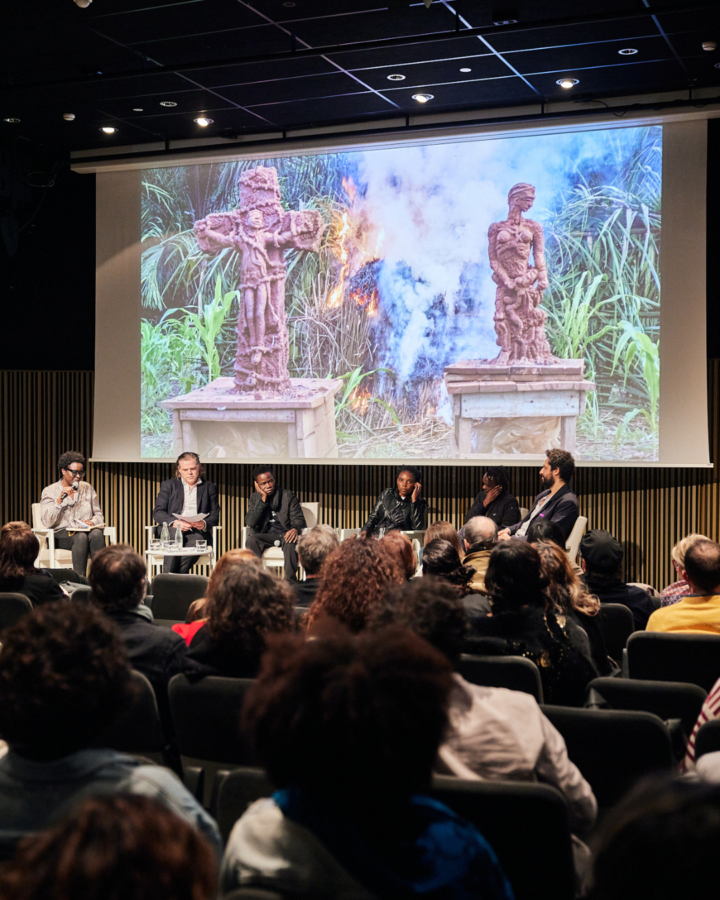
Photo credits: Leafhopper
As part of the DART Festival and in collaboration with MACBA, this event on 4 December explores the relationship between art and activism through the project presented by artist Renzo Martens and the Congolese artist collective CATPC at the 2024 Venice Biennale. The session includes the screening of three short films by the collective, followed by a discussion with Mbuku Kimpala, Ced’art Tamasala and Matthieu Kasiama (members of CATPC), Renzo Martens, and Hicham Khalidi, moderated by Elvira Dyangani Ose, Director of MACBA.
The event starts at 7 PM.
More info: here.
Bathtub Lecture Stedelijk Museum Amsterdam
During the third Bathtub Lecture on 30 November, artists Renzo Martens and Ced’art Tamasala will outline a shared future for the Stedelijk in which the museum is by and for everyone.
Before the lecture, Martens will perform a partial re-enactment of an iconic work by artist Jan Dibbets from 1969, in which he dug trenches at each corner of the Stedelijk building to expose the museum’s foundations.
Martens says: “Workers are co-authors of the Stedelijk. This awareness can form the basis for a museum that is by and for everyone.”
Start performance: 10:30 (outside of Stedelijk Museum, Van Baerlestraat side)
Start lecture: 15:00 (Auditorium Stedelijk Museum)

Naissance merveilleuse, CATPC, Venice Biennale, photo: Peter Tijhuis, 2024
From December 21, 2024, to March 2, 2025, the Van Abbemuseum presents Two Sides of the Same Coin, a powerful solo exhibition by CATPC following their Venice Biennale showcase. Featuring sculptures, drawings, textiles, and video installations, the exhibition explores themes of colonization, land regeneration, and the global art world’s structures of recognition and wealth.
Programme in Terneuzen City Center
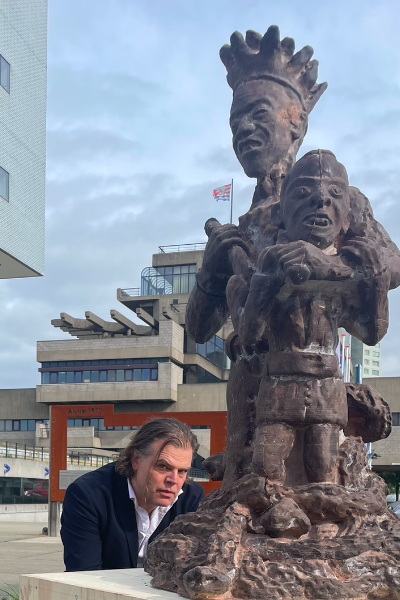
Six sculptures by the art collective of plantation workers CATPC were on display from 9 to 27 October in the center of Terneuzen, the Netherlands, as part of the celebration of the opening of the new sluices. This is a step towards the programme LEARN, DIG, BUILD, leading up to a new arts center in Zeeuws-Vlaanderen that will focus on exchange between global working-class communities. On Saturday 12 October, screenings of the film White Cube were followed by a talk by Renzo Martens to elaborate on the ideas behind the new arts center.
Grant for New Art Platform in Zeeland
The Institute for Human Activities (IHA) receives €250,000 grant from the Province of Zeeland for the project LEARN, DIG, BUILD. IHA’s goal for the coming years is to put their unique working model and expertise for the benefit of structural change in the Netherlands, and more specifically: to build a new art platform in Zeeland: a place for the art of the working class.
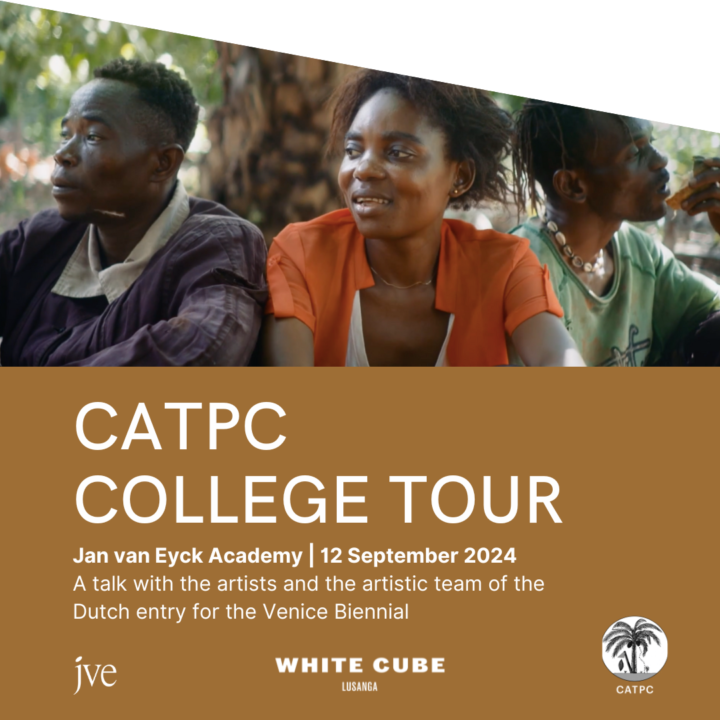
12 September was the start of CATPC’s tour of schools and academies in the Netherlands, where they talked about their experience as Dutch representatives at the Venice Biennale and their long-term practice of getting back their land, history and future through art.
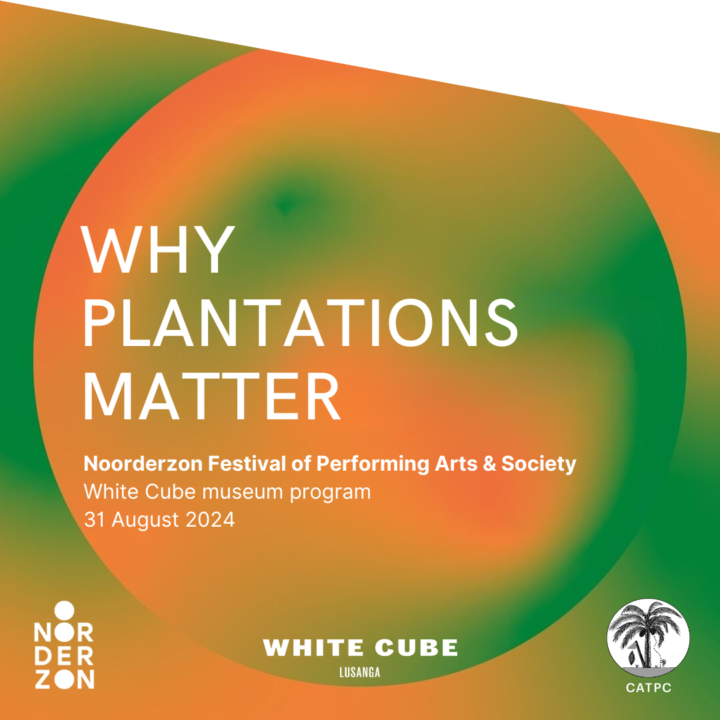
CATPC members Matthieu Kasiama, Mbuku Kimpala and Ced’art Tamasala went to Noorderzon Festival where they gave two talks and an introduction to the screening of the documentary series Plantations and Museums on Saturday 31 August 2024. Renzo Martens had a discussion with art and culture philosopher Thijs Lijster about the value of art and culture on 28 August. One of CATPC’s sculptures was exhibited outside for the duration of the festival.
CATPC wins Grand Prize of S+T+ARTS Art Prize Africa ’24 with Balot NFT
The Balot NFT project by CATPC was selected out of 405 submissions from 35 countries to win the Grand Prize of the first STARTS Prize Africa. The award recognizes an innovative model of restitution that uses NFTs to re-collectivize African cultural assets, making them a tool of the decolonization movement.
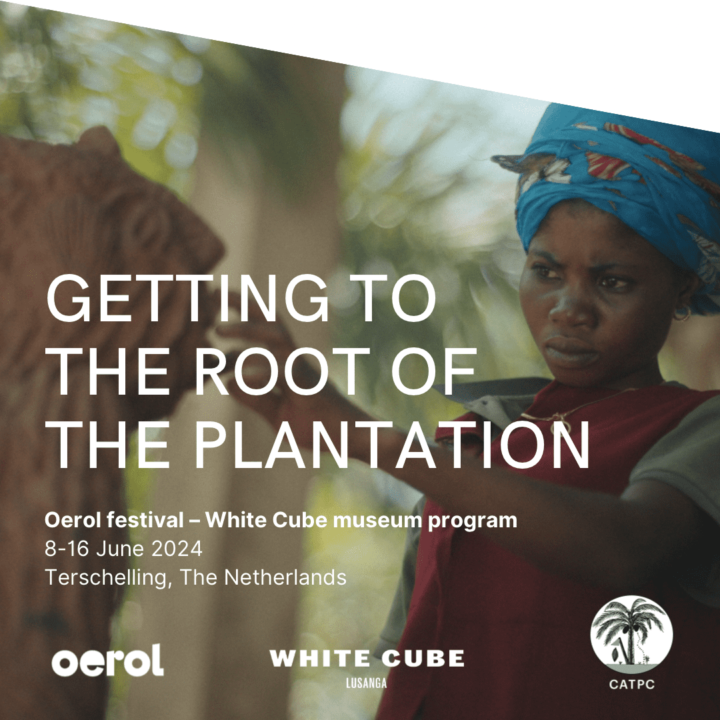
Image: CATPC member Irène Kanga with her sculpture ‘Racines’. Cinematography by Jurgen Lisse.
CATPC is taking part in the expedition program at Oerol, a theatre festival on the island of Terschelling, The Netherlands, with their installation ‘Getting to the Root of the Plantation’. Deep in the forest of the island, two sculptures will be on display: Racines (Irène Kanga / CATPC, 2023) and Crucifixion du Bailleur (Matthieu Kasiama & Ced’art Tamasala / CATPC, 2023).
CATPC member Blaise Mandefu Ayawo passed away
It is with deep sadness that we announce the passing of CATPC member Blaise Mandefu Ayawo. Blaise was 55 years old. He leaves a wife and five young children.
After installing the exhibition in the Dutch Pavilion, Blaise fell ill during the opening week of the 60th La Biennale di Venezia. After a hospitalization of almost two weeks, Blaise passed away. We are grateful to the staff at Ospedale dell’Angelo for their dedicated care.
Blaise Mandefu Ayawo
9/9/1968 – 29/4/2024
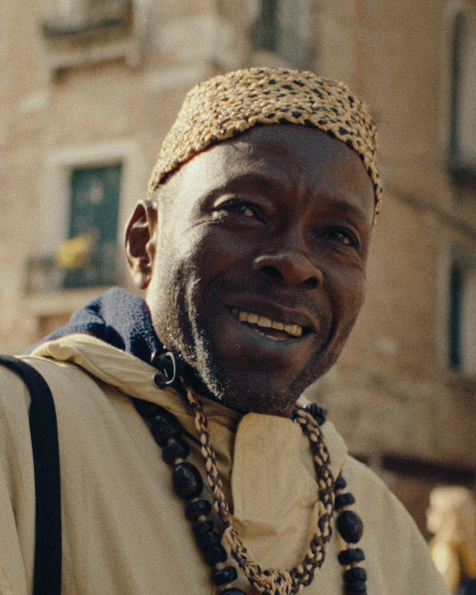
Blaise in Venice, photo: Jurgen Lisse, 2024.
Dutch Pavilion officially opened – Venice Biennale
17 April 2024
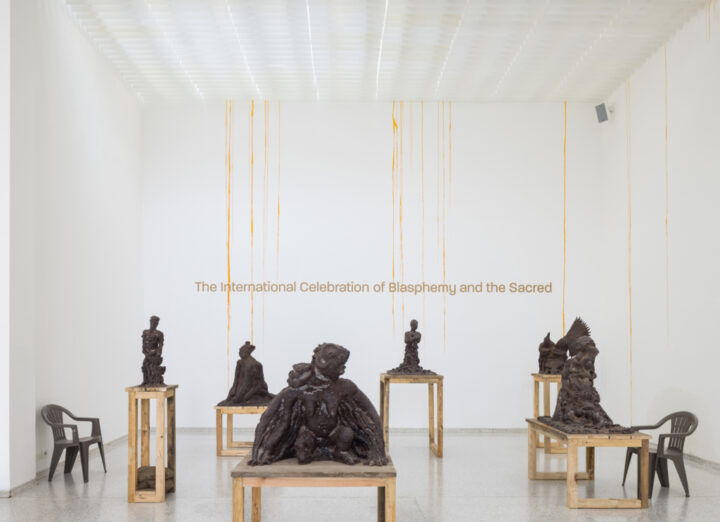
Image: Peter Tijhuis, 2024
The Dutch Pavilion at the 60th International Art Exhibition La Biennale di Venezia was officially opened on Wednesday 17 April by Barbera Wolfsensberger, Director-General of Culture and Media. The Dutch entry, The International Celebration of Blasphemy and The Sacred, is a presentation by Congolese artist collective Cercle d’Art des Travailleurs de Plantation Congolaise (CATPC). Created in collaboration with artist Renzo Martens and curator Hicham Khalidi, it highlights CATPC’s endeavour to reclaim the sacred forests of Lusanga, along with their broader mission of spiritual, ethical and economic reckoning.
Preview Dutch Pavilion – Venice Biennale 2024
27 March 2024
The Congolese artist collective Cercle d’Art des Travailleurs de Plantation Congolaise (CATPC) will represent the Netherlands at the Venice Biennale 2024, supported by artist Renzo Martens and curator Hicham Khalidi. In the run-up to the 60th biennale, opening on 20 April, they gave a preview of their joint plan and elaborated on the story behind their choices in De Balie, Amsterdam.
Ancestral sculpture Balot back in Congo
19 March 2024
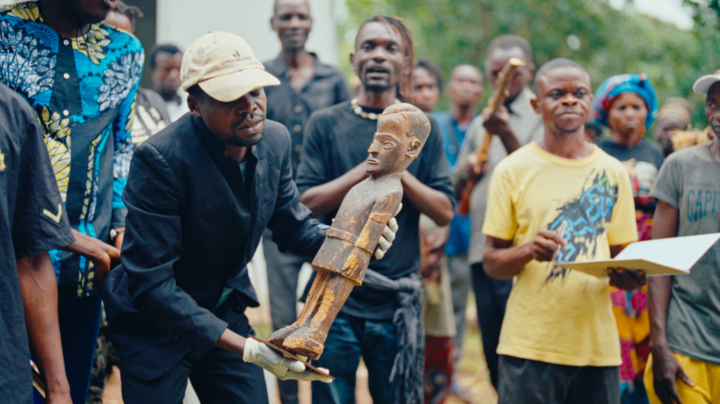
Film still from ‘The Judgement of the White Cube’, CATPC, 2024, image by Jurgen Lisse
Last week, the sculpture Balot arrived in Lusanga, Congo, from the Virginia Museum of Fine Arts (VMFA). On Tuesday 19 March, the artists’ collective Cercle d’Art des Travailleurs de Plantation Congolaise (CATPC) organised a special ceremony to welcome back the sculpture. In anticipation of the Dutch representation at the 60th edition of La Biennale di Venezia, CATPC applied for Balot’s temporary loan. CATPC is collaborating for the Dutch entry with artist Renzo Martens and curator Hicham Khalidi. The sculpture will be on public display at the White Cube in Lusanga from 20 April to 24 November 2024, in parallel with La Biennale di Venezia. At the Dutch pavilion in Venice, Balot will be on view via a live stream.
The Virginia Museum of Fine Arts (VMFA) approves temporary loan request by artist collective CATPC
12 February 2024
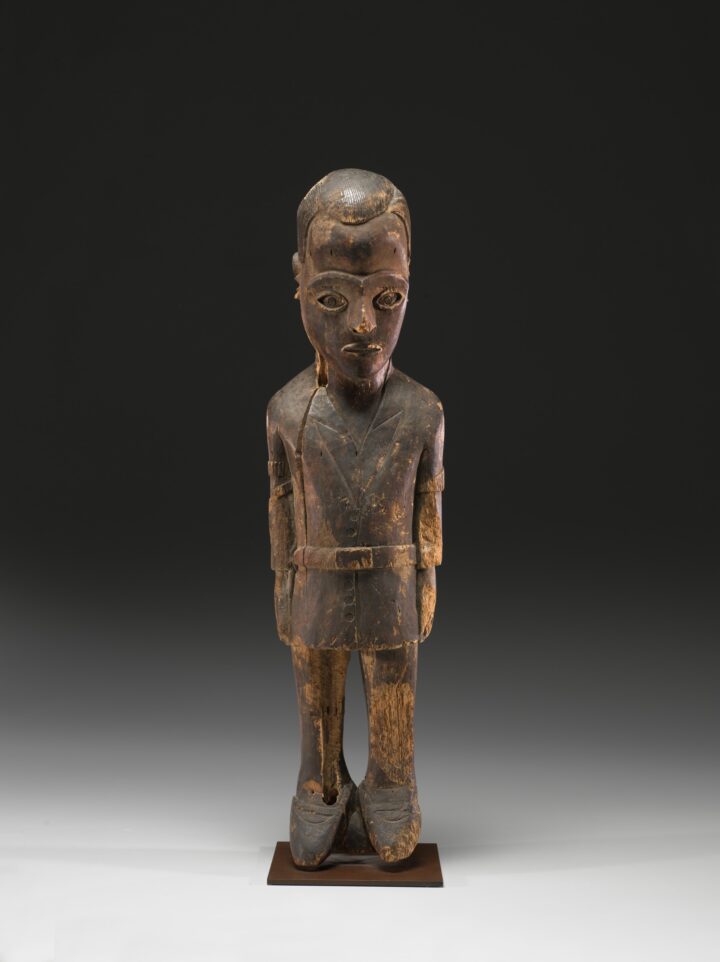
Image: Chief’s or Diviner’s Figure Representing the Belgian Colonial Officer, Maximilien Balot, circa 1931, Unknown artist (Pende, Democratic Republic of the Congo), wood (possibly Alstonia Boonei) with metal repair staples. Virginia Museum of Fine Arts, Aldine S. Hartman Endowment Fund, 2015.3. Photo by Travis Fullerton © 2015 Virginia Museum of Fine Arts.
Historic step forwards for artist collective Cercle d’Art des Travailleurs de Plantation Congolaise (CATPC) and Lusanga (DRC), as Virginia Museum of Fine Arts confirms the loan of the sculpture ‘Balot’, a carved wood ancestral power-figure made in 1931. CATPC requested the temporary loan of Balot in anticipation of the exhibition in the 2024 Dutch National participation at the International Art Exhibition of La Biennale di Venezia in collaboration with Dutch artist Renzo Martens and curator Hicham Khalidi. The sculpture is expected to be on display in Lusanga to the public from April 20 to November 24, 2024, parallel to the Biennale di Venezia.
CATPC and Renzo Martens Dutch Entry for the Venice Biennale 2024
17 April 2023
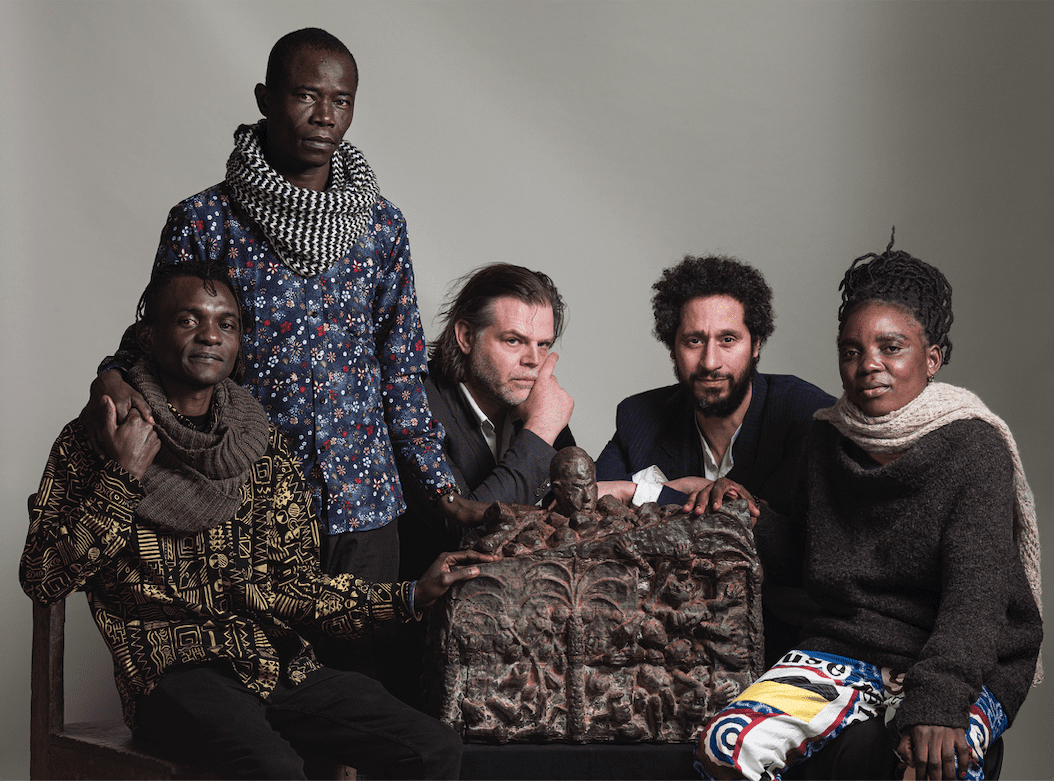 Image, from left to right: Ced’art Tamasala (CATPC), Matthieu Kasiama (CATPC), Renzo Martens, Hicham Khalidi, Mbuku Kimpala (CATPC). Photo: Koos Breukel, 2023
Image, from left to right: Ced’art Tamasala (CATPC), Matthieu Kasiama (CATPC), Renzo Martens, Hicham Khalidi, Mbuku Kimpala (CATPC). Photo: Koos Breukel, 2023
Renzo Martens, Cercle d’Art des Travailleurs de Plantation Congolaise (CATPC) and curator Hicham Khalidi will be providing the Dutch entry for the Venice Biennale 2024. The joint plan will be open to the public from 20 April 2024 at the Rietveld Pavilion in Venice and simultaneously at the White Cube in Lusanga, the Democratic Republic of Congo (DRC). This Dutch entry will therefore consist of two presentations that are directly mirrored and connected.
31 August – 3 September 2023
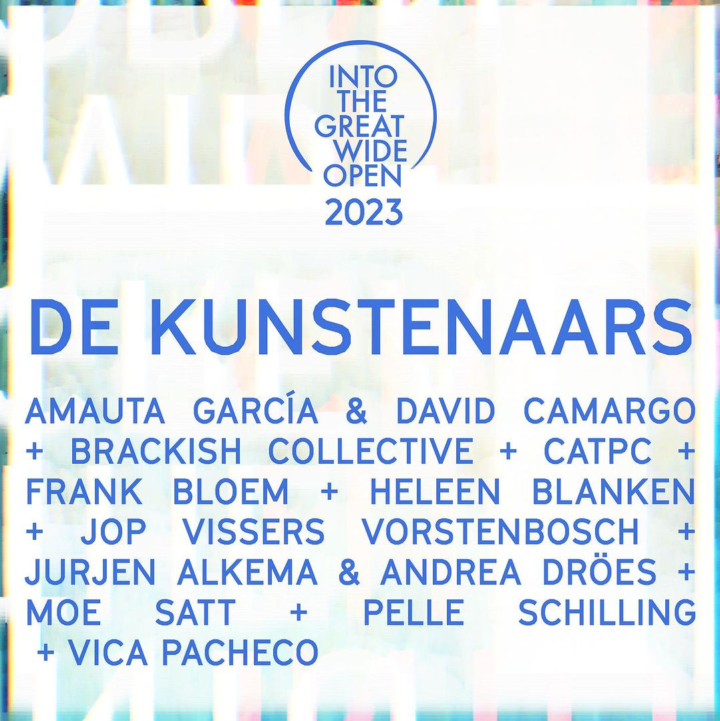
Several works by CATPC and Renzo Martens will be on view as part of Into the Great Wide Open’s festival art program.
The installation Why Plantations Matter will be spread out over the forest of Vlieland and in the Tromp’s Huys museum. In the forest, you will find Athanas Kindendie / CATPC’s Plantation Monoculture – a sculpture which criticizes the monoculture of palm plantations that took a century-long grip on the land and completely depleted it – and the Balot NFT. In the museum, the series Plantations and Museums will be on view.
Current Vacancies at Human Activities
1 September 2023
We are looking for:
Medewerker Financiën, Subsidies en Bureau (filled)
Intern Projects and Exhibitions (filled)
7 June 2023
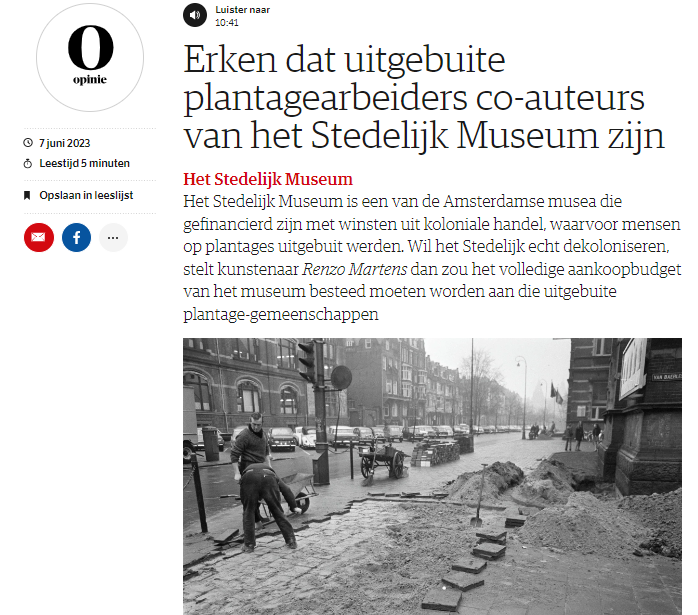
Image: Screenshot of Renzo Martens’ publication on NRC, including “On the loose” by Jan Dibbets (1969), photo: Stedelijk Museum Amsterdam
On 7 June 2023, Renzo Martens’ article about the connection between plantation workers and the Stedelijk Museum Amsterdam was published. In the publication, Martens begins by presenting the work of Dutch artist Jan Dibbets who, in 1969, dug out the four corners of the Stedelijk Museum to expose its foundations and question the existence of the museum. Fifty years later, while still speculating on the unrestrained continuation of plantation labor, the Stedelijk has not yet given credit to the plantation workers who contributed to the construction of the museum. Martens writes:
“The truth is that plantation workers are the co-authors of every single wall, every beam of light and every line of perspective.”
CATPC Walk & Talk at the Oude Kerk
19 March 2023
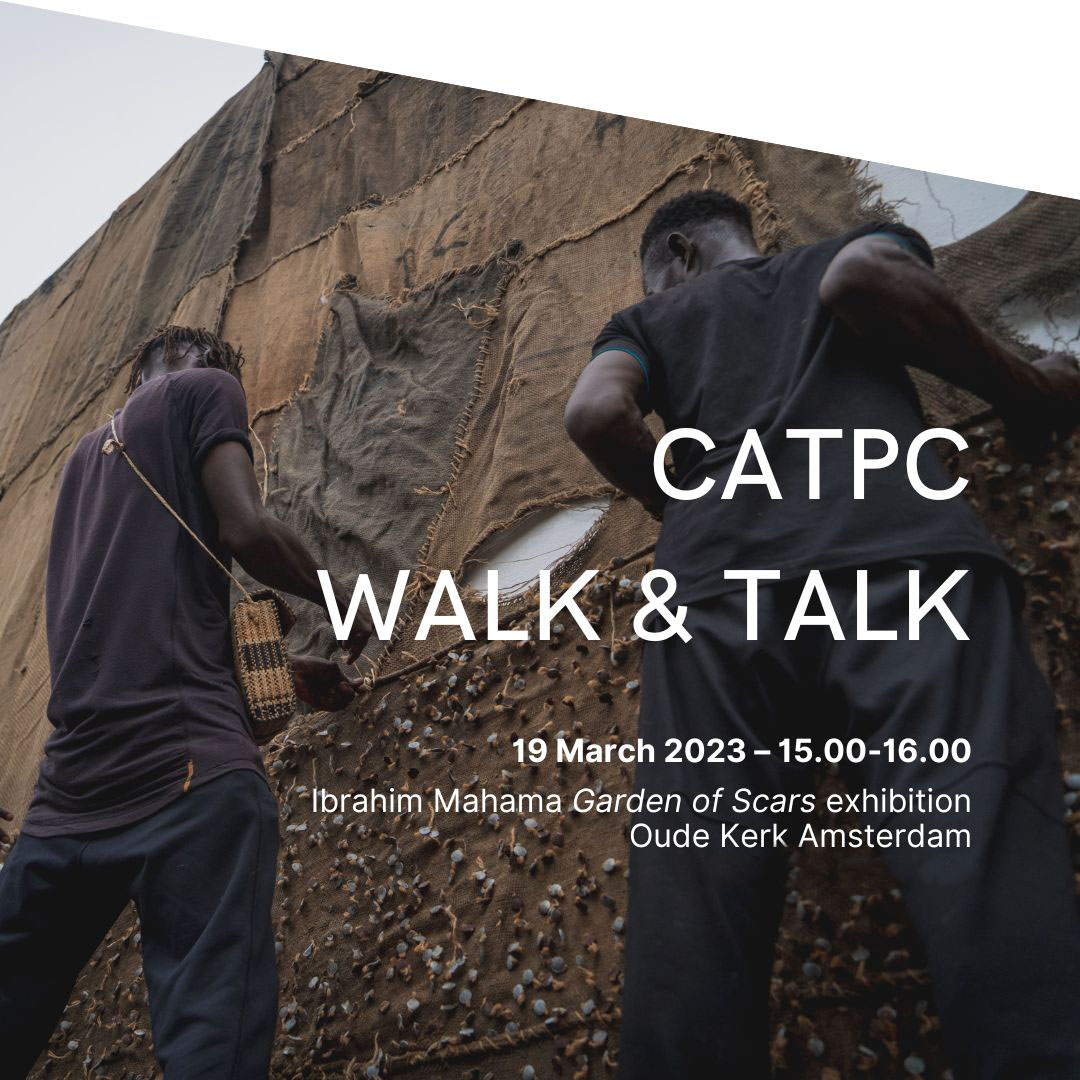
Image: Ced’art Tamasala and Matthieu Kasiama (CATPC) installing Ibrahim Mahama’s “Judgment of the White Cube” solo show at the White Cube in Lusanga, photo: Dareck Tuba, 2022
Join the Congolese Plantation Workers Art League CATPC as they reflect upon last year’s Ibrahim Mahama show Judgment of the White Cube at their museum in the middle of a plantation, the White Cube Lusanga, from the site of Mahama’s latest exhibition Garden of Scars at the Oude Kerk, Amsterdam.
